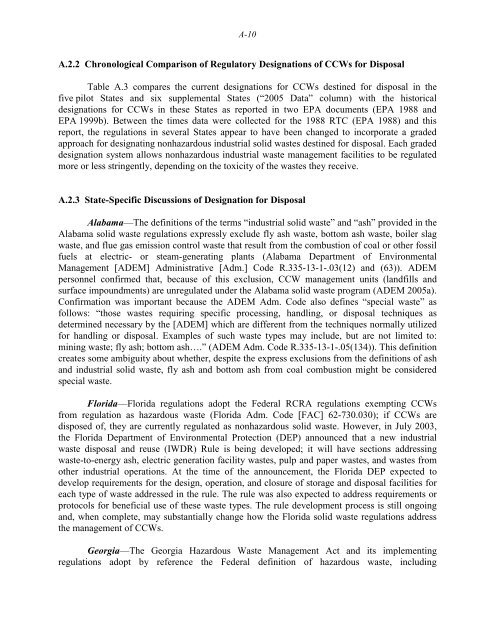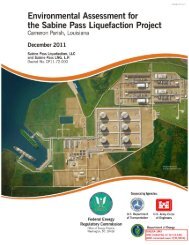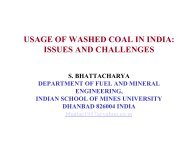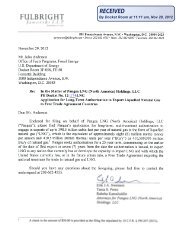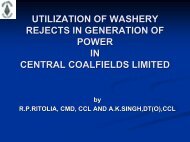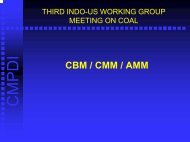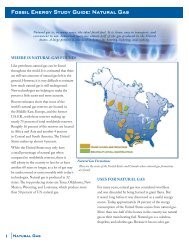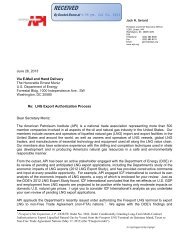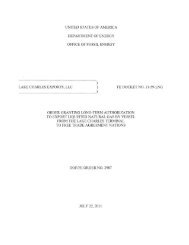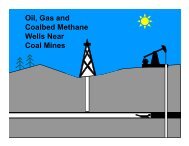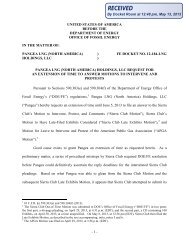Coal Combustion Waste Management at - DOE - Fossil Energy ...
Coal Combustion Waste Management at - DOE - Fossil Energy ...
Coal Combustion Waste Management at - DOE - Fossil Energy ...
Create successful ePaper yourself
Turn your PDF publications into a flip-book with our unique Google optimized e-Paper software.
A-10<br />
A.2.2 Chronological Comparison of Regul<strong>at</strong>ory Design<strong>at</strong>ions of CCWs for Disposal<br />
Table A.3 compares the current design<strong>at</strong>ions for CCWs destined for disposal in the<br />
five pilot St<strong>at</strong>es and six supplemental St<strong>at</strong>es (“2005 D<strong>at</strong>a” column) with the historical<br />
design<strong>at</strong>ions for CCWs in these St<strong>at</strong>es as reported in two EPA documents (EPA 1988 and<br />
EPA 1999b). Between the times d<strong>at</strong>a were collected for the 1988 RTC (EPA 1988) and this<br />
report, the regul<strong>at</strong>ions in several St<strong>at</strong>es appear to have been changed to incorpor<strong>at</strong>e a graded<br />
approach for design<strong>at</strong>ing nonhazardous industrial solid wastes destined for disposal. Each graded<br />
design<strong>at</strong>ion system allows nonhazardous industrial waste management facilities to be regul<strong>at</strong>ed<br />
more or less stringently, depending on the toxicity of the wastes they receive.<br />
A.2.3 St<strong>at</strong>e-Specific Discussions of Design<strong>at</strong>ion for Disposal<br />
Alabama—The definitions of the terms “industrial solid waste” and “ash” provided in the<br />
Alabama solid waste regul<strong>at</strong>ions expressly exclude fly ash waste, bottom ash waste, boiler slag<br />
waste, and flue gas emission control waste th<strong>at</strong> result from the combustion of coal or other fossil<br />
fuels <strong>at</strong> electric- or steam-gener<strong>at</strong>ing plants (Alabama Department of Environmental<br />
<strong>Management</strong> [ADEM] Administr<strong>at</strong>ive [Adm.] Code R.335-13-1-.03(12) and (63)). ADEM<br />
personnel confirmed th<strong>at</strong>, because of this exclusion, CCW management units (landfills and<br />
surface impoundments) are unregul<strong>at</strong>ed under the Alabama solid waste program (ADEM 2005a).<br />
Confirm<strong>at</strong>ion was important because the ADEM Adm. Code also defines “special waste” as<br />
follows: “those wastes requiring specific processing, handling, or disposal techniques as<br />
determined necessary by the [ADEM] which are different from the techniques normally utilized<br />
for handling or disposal. Examples of such waste types may include, but are not limited to:<br />
mining waste; fly ash; bottom ash….” (ADEM Adm. Code R.335-13-1-.05(134)). This definition<br />
cre<strong>at</strong>es some ambiguity about whether, despite the express exclusions from the definitions of ash<br />
and industrial solid waste, fly ash and bottom ash from coal combustion might be considered<br />
special waste.<br />
Florida—Florida regul<strong>at</strong>ions adopt the Federal RCRA regul<strong>at</strong>ions exempting CCWs<br />
from regul<strong>at</strong>ion as hazardous waste (Florida Adm. Code [FAC] 62-730.030); if CCWs are<br />
disposed of, they are currently regul<strong>at</strong>ed as nonhazardous solid waste. However, in July 2003,<br />
the Florida Department of Environmental Protection (DEP) announced th<strong>at</strong> a new industrial<br />
waste disposal and reuse (IWDR) Rule is being developed; it will have sections addressing<br />
waste-to-energy ash, electric gener<strong>at</strong>ion facility wastes, pulp and paper wastes, and wastes from<br />
other industrial oper<strong>at</strong>ions. At the time of the announcement, the Florida DEP expected to<br />
develop requirements for the design, oper<strong>at</strong>ion, and closure of storage and disposal facilities for<br />
each type of waste addressed in the rule. The rule was also expected to address requirements or<br />
protocols for beneficial use of these waste types. The rule development process is still ongoing<br />
and, when complete, may substantially change how the Florida solid waste regul<strong>at</strong>ions address<br />
the management of CCWs.<br />
Georgia—The Georgia Hazardous <strong>Waste</strong> <strong>Management</strong> Act and its implementing<br />
regul<strong>at</strong>ions adopt by reference the Federal definition of hazardous waste, including


